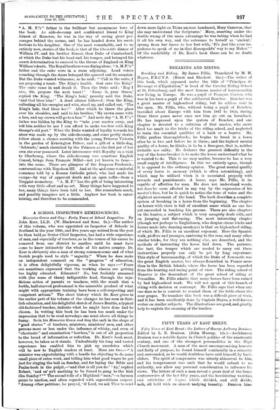BREAKING AND RIDING.
Breaking and Biding. By James Finis. Translated by M. H. Hayes, F.R.C.V.S. (Hurst and Blackett. 16s.)—The writer of this book, which appeared under the title of "Principes de Dressage et d'Equitation," is head of the Cavalry Riding School at St. Petersburg, and the most famous master of horsemanship now living in Europe. He was a pupil of Francois Carvon, who was in his turn a pupil of the celebrated Boucher. Boucher was a great master of high-school riding, but he seldom rode in the open. Mr. Fillis, who, without being a pupil of Boucher, travelled about Europe with him from 1847 to 1850, during those three years never once saw him go out on horseback. He has improved upon the system of Boucher, and one chapter is devoted to a criticism of that master, who sacri- ficed too much to the tricks of the riding school, and neglected to train the essential qualities of a hack or a hunter. Mr. Piths prefers thoroughbreds; he begins to break in a horse after he is two and before he is three; and the highest mental quality of a horse, he thinks, is to be a free-goer, that is, neither irritable nor sulky. He declares the greatest difficulty in the way of the horse-breaker is to make the horse understand what he is wanted to do. This is no easy matter, because he has a very small supply of intelligence. In this we entirely agree, though it is opposed to the ordinary opinion. The great mental quality of every horse is memory (which is often astonishing), and which may be utilised when it is associated properly with rewards and punishments. A horse, says Mr. Fillis, is in- capable of affection for man. He does not understand words, nor does he seem affected in any way by the expression of his master's face, but he is quick to notice the tone of voice and the slightest movement of the hand. The book describes a complete system of breaking in a horse from the beginning. The chapter on horses with vices is full of excellent sense which no one has yet succeeded in teaching his grooms. There are also chapters on the hunter, a subject which is very meagrely dealt with, and on jumping and flat-racing. The most interesting chapter (though not perhaps to Englishmen, who despise circus tricks and horses made into dancing monkeys) is that on high-school riding, of which Mr. Falls is an excellent exponent. Hero the Spanish walk, piaffers and passages, cantering to the rear, and many other similar tricks, for they are nothing else, are described, and the methods of instructing the horse laid down. The patience, the tact, the temper which are needed to carry out these instructions properly can only be got by long experience. This style of horsemanship, of which the Duke of Newcastle was the great English master, has always flourished in France more than in the British Islands, where the horse has been regarded from the hunting and racing point of view. The riding school of Hanover is the descendant of the great school of riding at Versailles. Mr. Fillis admits that many horses have been ruined by bad high-school work. We will not speak of this branch of riding with derision or contempt. Mr. Fillis says that when any one does so he is content to remind them of the fable about the sour grapes. To translate this book was a difficult piece of work, and it has been excellently done by Captain Hayes, a well-known writer on similar subjects. The illustrations are good, and greatly help to explain the meaning of the teacher.


















































 Previous page
Previous page